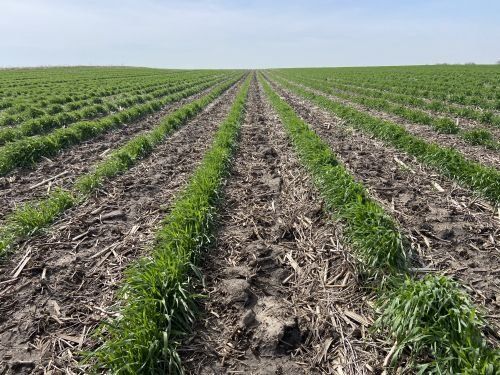Producers with Crop Insurance to Receive Premium Benefit for Cover Crops

Agricultural producers who have coverage under most crop insurance policies are eligible for a premium benefit from the U.S. Department of Agriculture (USDA) if they planted cover crops during this crop year. The Pandemic Cover Crop Program (PCCP), offered by USDA’s Risk Management Agency (RMA), helps farmers maintain their cover crop systems, despite the financial challenges posed by the pandemic.
The PCCP is part of USDA’s Pandemic Assistance for Producers initiative, a bundle of programs to bring financial assistance to farmers, ranchers and producers who felt the impact of COVID-19 market disruptions.
About the Premium Benefit
PCCP provides premium support to producers who insured their spring crop with most insurance policies and planted a qualifying cover crop during the 2021 crop year. The premium support is $5 per acre, but no more than the full premium owed.
Illinois, Indiana and Iowa have existing programs for producers to receive a premium benefit for planting cover crops. In these states, participating producers will receive an additional benefit.
All cover crops reportable to FSA are eligible and include cereals and other grasses, legumes, brassicas and other non-legume broadleaves, and mixtures of two or more cover crop species planted at the same time.
To receive the benefit for this program, producers must file a Report of Acreage form (FSA-578) for cover crops with USDA’s Farm Service Agency (FSA) by June 15, 2021, which is distinct from the normal acreage reporting date. The normal acreage reporting deadline with FSA has not changed, but to receive the premium benefit, producers must file by June 15. The cover crop fields reported on the Report of Acreage form must match what the producer reported to their insurance company for crop insurance policies. To file the form, producers must contact and make an appointment with their local USDA Service Center.
More Information
Certain policies are not eligible because they have underlying coverage, which would already receive the benefit or are not designed to be reported in a manner consistent with the Report of Acreage form (FSA-578). PCCP is not available for Whole-Farm Revenue Protection, Enhanced Coverage Option, Hurricane Insurance Protection – Wind Index, and Supplemental Coverage Option. Stacked Income Protection (STAX) and Margin Protection (MP) policies are only eligible for PCCP when insured as a standalone policy. STAX and MP endorsements to underlying policies are not eligible for PCCP.
PCCP does not change acreage reporting dates, reporting requirements, or any other terms of the crop insurance policy.
More information, including frequently asked questions, can be found at farmers.gov/pandemic-assistance/cover-crops
An informational webinar will be held June 7, 10:30 AM - 11:30 AM CT







